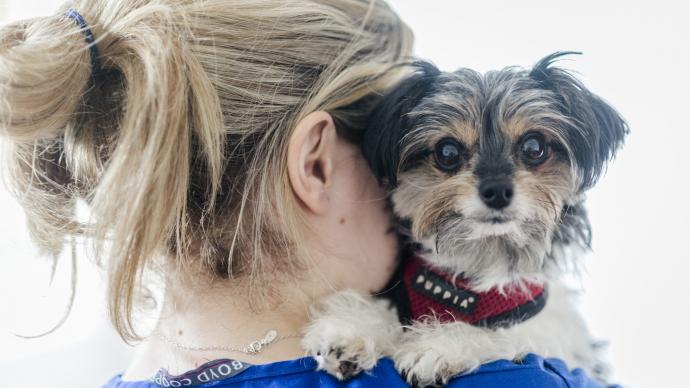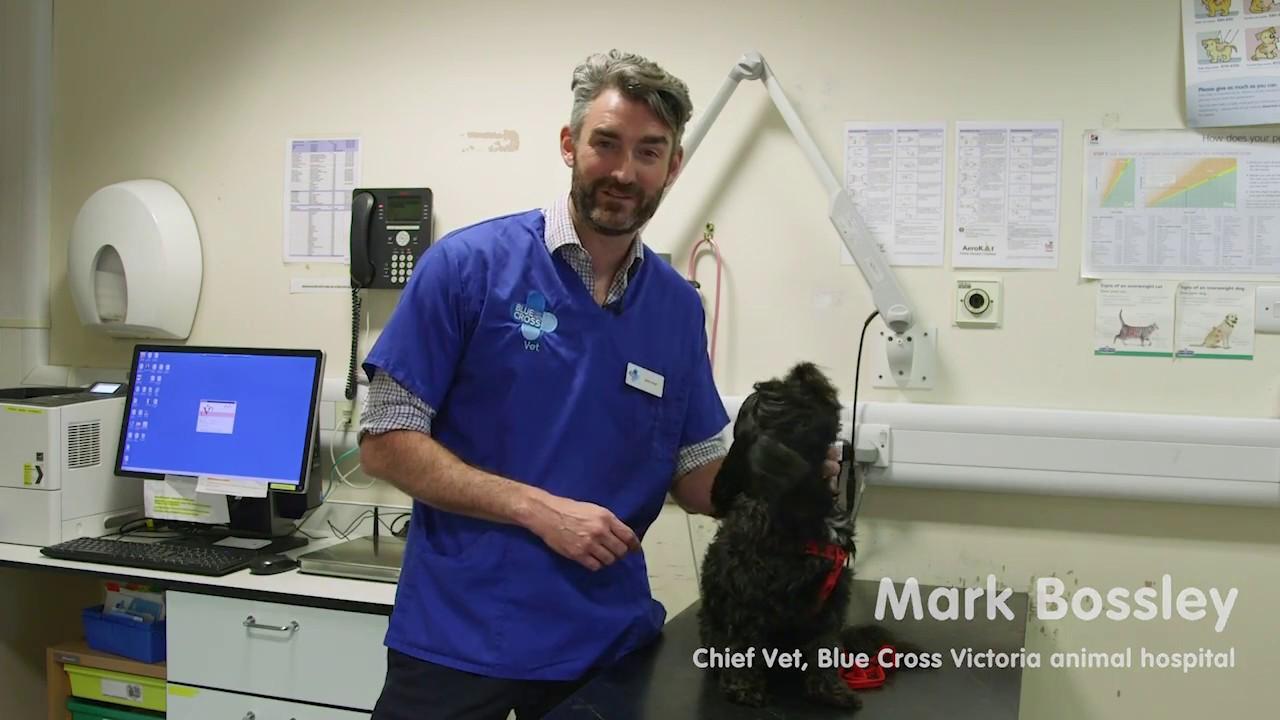
Neutering your dog
What is neutering?
Neutering is when a vet prevents a male or female dog from reproducing through surgery.
- In male dogs it’s called castration. A vet removes both testicles which takes away the main source of the male hormone, testosterone.
- In female dogs it’s called spaying. A vet removes both the ovaries, and usually the uterus. This means the female is unable to become pregnant.
You can also prevent a pregnancy by giving your dog injections and tablets. But you need to give these regularly and there's a risk of side effects as well as the ongoing cost.
If your dog has accidentally been mated, there is an injection to stop pregnancy.
When should I get my dog neutered?
There is not enough evidence to say when's the best time to neuter your dog and it can vary based on their breed, size and sex.
In female dogs, it's important that they are spayed at the right time. For example, many vets will avoid spaying a dog while she's in season or if she’s showing signs of false pregnancy in the weeks after a season.
Speak to your vet about what's best for your dog.
What does neutering involve?
Neutering your dog is done under general anaesthetic. All surgery has some risk, but neutering is very safe. After the surgery, your pet will be given something to control any pain they might have.
Preparation
Before your pet’s surgery, a vet will talk to you about how you need to prepare. This usually involves not feeding your dog anything before their surgery.
During the operation
Your dog will be given anaesthetic and painkillers to make sure they don’t feel anything during the operation. A vet will also clip the hair around where an incision (cut) needs to be made.
If your female dog is being spayed, a vet will make an incision in the abdomen (tummy) area. The ovaries, and usually the womb, will be removed.
If your male dog is being castrated, a vet will make a small incision so that their testicles can be removed.
Some vets will perform keyhole (laparoscopic) surgery, although it can be more expensive. A small camera and surgical instruments are inserted through small cuts, and the ovaries are removed. The benefits of this type of surgery are:
- a quicker recovery
- exercising sooner
- fewer complications
After the operation
A vet or vet nurse will continue to look after your pet and you’ll usually be able to pick them up a few hours after surgery. Some pets may take a little longer to recover but your vet practice will contact you to let you know how they're doing.
Recovery
Once your dog is home, they might be a bit sleepy for a few hours while the anaesthetic wears off - don't worry, this is completely normal. This can take up to a day to wear off completely. Your vet will let you know how long they'll need to rest and what to do, including making sure your dog:
- takes any prescribed medication
- does not run or jump around – this will help their wound heal and prevent any complications
- does not lick their wound – you might need a protective cone, buster collar or body suit to stop them licking the area. Your vet should provide these.
- has a check-up at the vet to make sure everything is healing as it should and to get any stitches removed – your vet should book this in
Important
Call your vet if you have any concerns about how your pet is recovering. They’ll be able to check if there are any complications (eg infection) and make sure they get treatment quickly.
Will my dog get fat after neutering?
Neutering can affect your dog's appetite and they may be more prone to putting on weight. Ask your vet about how much food you should be feeding your dog or changing to a food designed for neutered pets to keep them happy and healthy.
Can I compete if my dog is neutered?
Yes. Neutered pedigree dogs can be shown according to Kennel Club rules.
How much does it cost to neuter your dog?
Check with your vet as the cost of castration or spaying can vary depending on the type of dog you have. As a rough guide spays cost from around £130 to £365 and castrations from around £110 to £300.
Spaying usually costs more than dog castration because it involves surgery to internal organs. But it can cost more if your dog has a retained testicle (when the testicle fails to drop down into the scrotum). Larger dogs can also cost more to neuter than smaller dogs because they need more anaesthetic and the surgery will usually take longer.
Check if you are eligible for Blue Cross vet care.
Will my dog change after neutering?
You might be worried that your dog's personality will change. It's unlikely that your this will happen but you should talk to your vet about any concerns you may have.
Should I get my dog neutered?
Every dog is unique and you should discuss the benefits and risks of neutering with your vet.
Health benefits
- Castration for male dogs significantly reduces the chance of them getting prostate disease and reduces the risk of some cancers
- Spaying female dogs reduces the risk of them getting breast cancer (known as ‘mammary cancer’ in dogs) which can be fatal. There is also evidence to suggest that spaying before two and a half years may reduce the risk the most.
- Spaying your dog eliminates the risk of an infection of the womb (called pyometra), which studies show affects up to a quarter of unneutered female dogs and can be fatal. If your dog is suffering from pyometra and needs to be spayed as part of treatment, this will be more expensive than spaying a healthy dog. The risks of the surgery are also likely to be much greater.
- Pregnancy and birth can be risky to the mum
- Many unneutered female dogs have a false pregnancy after a season and, although this is natural, it can cause behavioural and medical problems
Benefits for you
- If a female gets pregnant, it can be very expensive and puppies need a lot of care. Neutering your dog will make sure that you don’t have to worry about expensive vet bills and caring for new puppies at all hours!
- Female dogs in heat can be messy – they produce a bloody discharge which can last for around three weeks
- You should check your female dog’s nipples and mammary glands regularly for mammary tumours if they have not been spayed when young. We recommend doing this every three months.
If a dog has a behaviour issue
Speak to your vet and a qualified behaviourist if you're worried about any aspect of your dog’s behaviour, as neutering can make certain problem behaviours worse. They'll be able to advise you on how to help manage your dog's behaviour whether you choose to have them neutered or not.
It’s commonly believed that neutering will help young dogs ‘calm down’, but there isn’t any real evidence for this. If your young dog is boisterous, not coming when called or generally ignoring you on walks, our information on adolescence in dogs might help.
What are the risks of neutering?
As with all surgery, neutering carries a risk. Although complications are rare, the risk depends on factors including the health of your dog, age and breed.

Donate today
We rely on donations to provide accurate, expert pet advice. If you found this page useful, help us by donating.

Donate today
We rely on donations to provide accurate, expert pet advice. If you found this page useful, help us by donating.





